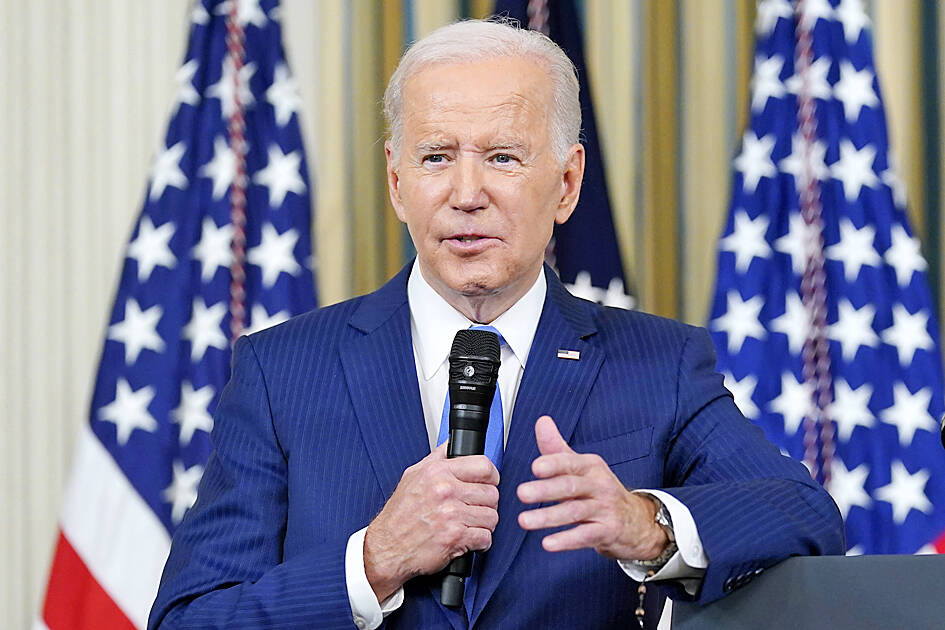US President Joe Biden’s administration has added 37 companies from China’s mining, solar and textile sectors to its list of those banned from exporting to the US due to alleged forced labor practices in the Xinjiang region.
The firms include mining giant Zijin Mining Group (紫金礦業) and solar companies such as a subsidiary of JA Solar Technology Co (晶澳太陽能科技), a statement from the US Department of Homeland Security said.
The list also includes textile manufacturer Huafu Fashion Co (華孚時尚) and 25 of its subsidiaries.

Photo: AP
US and European companies have been under pressure to pull away from factories that make clothes and other products in the Xinjiang region. Labor groups have documented alleged forced labor camps and other poor working conditions involving the local Uighur population. China disputes these claims.
The additions represent the largest single expansion of the Uyghur Forced Labor Prevention Act list since the law was passed in 2021, and bring the total number of companies banned to 144, the statement said.
Major Chinese solar companies have already started switching to more expensive polysilicon from Western countries to eliminate risks linked to the law and import ban. As for JA Solar, the impact of its addition to the US list is expected to be limited as the subsidiary closed last year and did not supply directly or indirectly to the US, a note by BofA Global Research said.
“That said, this serves another reminder that Chinese solar will face rising trade headwinds especially in the US,” BofA Global said.

UNCERTAINTY: Innolux activated a stringent supply chain management mechanism, as it did during the COVID-19 pandemic, to ensure optimal inventory levels for customers Flat-panel display makers AUO Corp (友達) and Innolux Corp (群創) yesterday said that about 12 to 20 percent of their display business is at risk of potential US tariffs and that they would relocate production or shipment destinations to mitigate the levies’ effects. US tariffs would have a direct impact of US$200 million on AUO’s revenue, company chairman Paul Peng (彭雙浪) told reporters on the sidelines of the Touch Taiwan trade show in Taipei yesterday. That would make up about 12 percent of the company’s overall revenue. To cope with the tariff uncertainty, AUO plans to allocate its production to manufacturing facilities in

TAKING STOCK: A Taiwanese cookware firm in Vietnam urged customers to assess inventory or place orders early so shipments can reach the US while tariffs are paused Taiwanese businesses in Vietnam are exploring alternatives after the White House imposed a 46 percent import duty on Vietnamese goods, following US President Donald Trump’s announcement of “reciprocal” tariffs on the US’ trading partners. Lo Shih-liang (羅世良), chairman of Brico Industry Co (裕茂工業), a Taiwanese company that manufactures cast iron cookware and stove components in Vietnam, said that more than 40 percent of his business was tied to the US market, describing the constant US policy shifts as an emotional roller coaster. “I work during the day and stay up all night watching the news. I’ve been following US news until 3am

COLLABORATION: Given Taiwan’s key position in global supply chains, the US firm is discussing strategies with local partners and clients to deal with global uncertainties Advanced Micro Devices Inc (AMD) yesterday said it is meeting with local ecosystem partners, including Taiwan Semiconductor Manufacturing Co (TSMC, 台積電), to discuss strategies, including long-term manufacturing, to navigate uncertainties such as US tariffs, as Taiwan occupies an important position in global supply chains. AMD chief executive officer Lisa Su (蘇姿丰) told reporters that Taiwan is an important part of the chip designer’s ecosystem and she is discussing with partners and customers in Taiwan to forge strong collaborations on different areas during this critical period. AMD has just become the first artificial-intelligence (AI) server chip customer of TSMC to utilize its advanced

Six years ago, LVMH’s billionaire CEO Bernard Arnault and US President Donald Trump cut the blue ribbon on a factory in rural Texas that would make designer handbags for Louis Vuitton, one of the world’s best-known luxury brands. However, since the high-profile opening, the factory has faced a host of problems limiting production, 11 former Louis Vuitton employees said. The site has consistently ranked among the worst-performing for Louis Vuitton globally, “significantly” underperforming other facilities, said three former Louis Vuitton workers and a senior industry source, who cited internal rankings shared with staff. The plant’s problems — which have not